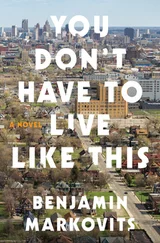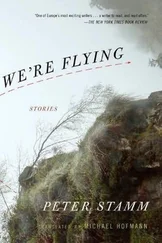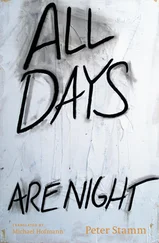“We met at night on the dunes. He was clumsy, and I didn’t have much of a clue either. Actually, it was pretty horrible, sand everywhere, and afraid of being caught. After that everything changed. Suddenly, everyone had a boyfriend or a girlfriend, and our group fell apart. One year, I didn’t go at all. I went hitchhiking around Europe with a girlfriend. But since then I’ve gone every year. Even if it was just for a few days. My old friends still go. Some have joined the police themselves, married, had babies, and now the kids are playing together. That’s the way of it.”
She asked Andreas when he had fallen in love for the first time. He said it was so long ago, he could hardly remember.
“Where are we going anyway?” asked Delphine, after they had passed Basel.
“To my village,” said Andreas. “We’ll be there in a couple of hours.”
“And what will we do there? Is there something worth seeing?”
Andreas shrugged his shoulders. The landscape was quite pretty, he said.
The nearer they came to the village, the more unsure he was whether it was a good idea to have taken Delphine with him. He didn’t know himself what he had in mind. To see his brother, his parents’ grave, maybe Fabienne. And then? He would have enough money from the sale of the apartment to live for a couple of years. But did he really want to go back to his village? He thought of fish that go back to the place they were born, in order to die. Or was it to spawn? Or both together? He couldn’t remember.
And what if Delphine really was pregnant? Andreas had never been particularly careful where birth control was concerned. For a long time he had thought he was infertile, then one day Nadia told him she had aborted a baby of his. She said it in her typical, indifferent way, which she only ever set aside when speaking about politics, or her ex. It didn’t seem to have occurred to her that Andreas might want the child, though in fact he was relieved she had taken the decision away from him. She had spoken, if he remembered correctly, not about a baby but about a condition. What had depressed him at the time wasn’t that the baby would never be born, it was that he seemed to accept it so easily. He had long since abandoned the idea that there might be some turning point in his life. Some time long ago he had chosen a certain path, a certain direction, and there was no going back on it. Even now, when he had given everything up, it was as though there was only one possible way. He didn’t have the feeling of freedom that he had had as a very young man. Everything was already decided. A baby wouldn’t change that either. He was reminded of what the doctor had said, that there was no sense in talking about odds. It was either-or. People were born, people died. It happened, or it didn’t happen. In the end, it barely mattered.
He looked at Delphine, sitting beside him silent and with eyes closed. He wondered what she was thinking or dreaming of. What had he dreamed of when he was her age? He did the math. It would have been at the end of his first year in Paris.
He came off the Autoroute a little earlier than necessary, and they took country roads through tiny villages, consisting of no more than a couple of farms apiece, a pub, sometimes a church. The road led straight along a wide valley. Only a very few cars met them, and once a boy on a tractor, pulling a mower. Either side of the road were meadows and fields and apple orchards. It was a hot afternoon. Andreas remembered afternoons like it, that felt like holidays, brooding heat on the land and the air every bit as hot and still as the earth. Over everything was a hazy brightness, in which even the shadows looked somehow pale. The forests too were silent, but for an occasional crackle, as if there was a fire burning somewhere.
They crossed the river, which was very low. It had been straightened a long time ago, and flowed in a line across the plain. Andreas stopped next to an old wooden covered bridge.
“What’s up?” asked Delphine.
“I just wanted to stretch my legs a bit.”
When he was a child, the road had gone over that bridge. Now it was closed to traffic. They crossed it on foot. Delphine took Andreas’s hand, but let it go after a few steps.
On the other side was a wooded slope and an abandoned inn, that had once been a customs house. After the bridge was closed to traffic, a small circus had made the place its winter quarters. Barns had been erected, and paddocks for the animals. There was a half-collapsed caravan by the side of the road, and some rusty tubs for a number involving lions. The terrain looked deserted, but for the screams of some exotic birds in a big cage on the very edge of the forest. Stinging nettles had sprung up in the shadow of the trees.
“How much further is it?” asked Delphine.
Andreas pointed to a hill on the horizon.
“We’ll be there in fifteen minutes. That’s the village over there.”
“What is it you want to do here?”
“I haven’t been for ten years. My brother still lives there. And probably a couple of my old friends.”
“Is it that you want to introduce me to your family?” asked Delphine, and laughed.
The door of the inn opened, and an old woman stepped out. She stopped on the top step and eyed the two newcomers suspiciously. Andreas and Delphine turned around, and returned to the car.
“Shall we go on?” asked Delphine.
Andreas hesitated, then he turned the key.
It was four o’clock when they reached the village. In the industrial zone, which sprawled across the plain, there were a couple of buildings that weren’t familiar to Andreas. Other than them, not much seemed to have changed in the last ten years. He was surprised at how well he remembered everything. But there was no emotion accompanying his memory. When he remembered the time of his growing up, it was as though he were leafing in some unknown person’s biography, and looking at pictures that weren’t anything to do with him.
On a wooden trestle table outside the local food-store, fireworks were on sale for the upcoming national holiday. Andreas parked behind the hotel, which had been built in the 1970s as part of a convention center. He had worked here as a night porter during his student years. Back then, the building had seemed to him luxurious; now it was small and a bit poky. Inside, it was dark and cool. There was no one at the desk, and it took a long time before anyone answered the bell.
The room smelled of cold cigarette smoke and air-freshener. There was a thick brown carpet on the floor, and multilayered orange curtains in the windows.
Andreas opened the window and looked out. He saw the foot of the hill, the reform church with its bright red roof, and the secondary school where he had gone for three long-forgotten years. He shut the window and drew the curtains. They were so dense that almost no light penetrated the room. Delphine had lain down on the bed, without pulling back the cover. Andreas lay down beside her.
“I can show you round the village, if you like. But it’s too hot for that really,” he said. “We could go to the swimming pool.”
“Is that what you want?”
“I’m sure it’ll be full of kids. With weather like this. We always used to go to the lake to swim. There are lots of lakes in the area.”
“I’d like to rest for a while,” said Delphine.
He kissed her. She said the place had a depressing effect on her already, she couldn’t say why. After all, she had hardly seen any of it.
“It’s all so perfect here, so spic and span. And everything seems just a little bit small. As if it was built for dwarves.”
“The Swiss are taller than the French,” said Andreas.
They lay side by side in silence. After a while, Delphine’s breathing became deep and regular. She must have fallen asleep.
Читать дальше












